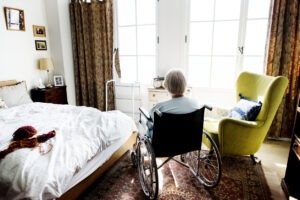What are nursing home regulations in Massachusetts? These laws govern how nursing homes function, regulating things like admissions, bed holding, and discharge or transfer decisions. Homes that break these regulations could endanger patients.
If you believe a nursing home disobeyed regulations and harmed a loved one, you can turn to a Boston nursing home abuse lawyer for help. Our team at Jason Stone Injury Lawyers can review your situation today.
Find out if you have a legal claim for compensation by calling or filling out our online contact form.
What Are Nursing Home Regulations in Massachusetts?
Nursing home regulations in Massachusetts detail specific rules these facilities must follow to adhere to state and federal guidelines. Regulations cover a wide range of administrative concerns.
These rules deal with:
Admissions
Nursing homes have to follow specific rules when admitting new patients. Many of these regulations deal with payments. Nursing homes cannot:
- Require third-party guarantees of payment
- Limit a patient’s choice of pharmacy or physician
- Require residents to pay attorney fees
- Require residents to waive the home’s liability
- Ask for a non-refundable deposit greater than the cost of a month’s care
Nursing homes in the state are not permitted to discriminate against potential residents based on their payment source.
Transferring a Resident
Nursing homes have an obligation not to transfer residents between “distinct areas” without due cause. Residents have a right to appeal any proposed transfers, such as moves from a unit certified for Medicare to one without Medicare certification.
Generally, nursing homes can only transfer or discharge residents if:
- The resident no longer requires the care offered by the nursing home
- Staying would endanger the safety or health of residents at the nursing home
- The nursing home stopped operating
The facility may also transfer a resident that no longer pays for services.
Re-Admission to a Facility
In many cases, nursing home facilities in Massachusetts must re-admit residents who left to stay at a hospital. They can only re-admit patients if they’re medically stable and still require care in a nursing home.
Additional regulations may apply to nursing home readmission.
Bed Hold Requirements
Residents of nursing homes have a right to return to their beds after a leave of absence for medical or non-medical reasons. Generally, facilities must hold a bed for ten days in Massachusetts.
Reporting Abuse, Neglect, and Mistreatment
Massachusetts requires all nursing homes to post information about Patient Abuse Law in a conspicuous location. The facility must post this notice on every floor that the public, patients, and residents can access.
The information must also include details on Patient Abuse Regulations and the steps to report any kind of suspected:
- Neglect
- Mistreatment
- Abuse
- Misappropriation
Concerned individuals can report these issues directly to the Department of Public Health.
What’s the Purpose of Massachusetts Nursing Home Regulations?
Nursing home regulations serve as safeguards for facility residents. These rules protect the individual preferences and needs of residents.
Nursing homes have an obligation to provide residents with care that helps support their mental, physical, and psychosocial well-being. If you believe a nursing home violated state or federal regulations, you can contact a lawyer to discuss your situation.
What Should You Do if a Nursing Home Violates Regulations?
Nursing home regulations in Massachusetts control everything from patient intake to reporting acts of negligence. Employees at the nursing home also have a responsibility to provide all residents with the healthcare they require.
Failure to follow regulations or appropriately maintain a duty of care to residents can have severe results. You may report the nursing home if they violate financial rules, forcing the facility to adjust their actions.
If you suspect an act of negligence or abuse, it’s important to immediately report it to the Department of Health or even the police, depending on the severity of harm to the nursing home resident. You may also need to contact a nursing home abuse lawyer immediately.
How Can a Lawyer Help with Nursing Home Cases?
Our team at Jason Stone Injury Lawyers has two decades of experience we use when handling nursing home abuse and neglect cases in Massachusetts. Your attorney can:
- Gather evidence to demonstrate acts of abuse or neglect
- Identify the party (or parties) who violated nursing home regulations
- Speak with witnesses
- Track the losses your family experienced
- Represent you in and out of court
We’ll stand up for your family, helping you navigate the legal system as part of our Stone Cold Guarantee. Depending on your circumstances, an attorney may help you secure funds to cover:
- Your loved one’s medical expenses caused by nursing home abuse
- Your lost pay if you need to take off work to care for a loved one
- The pain and mental anguish caused by nursing home abuse or neglect
Find out more by contacting us today for advice. There’s no obligation, just information ®.
Speak to Us About Massachusetts Nursing Home Regulations
You can review nursing home regulations in Massachusetts with our team at Jason Stone Injury Lawyers. We’re ready to review your situation and discuss any legal options you have for securing compensation.
Find out more about how we can help by calling or completing our online contact form.
Not Trusting What You’re Being Told?
Better Phone Stone
800-577-5188
 START MY NO OBLIGATION CONSULTATION
START MY NO OBLIGATION CONSULTATION










